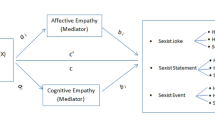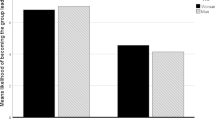Abstract
Business students evaluated aggressive humor used by a hypothetical manager in an organizational case. In general, males judged the humor funnier and more appropriate in the context than did females. Some evidence supporting the intergroup-conflict theory of humor was obtained because funniness ratings were higher when victim sex and manager sex were opposite. Males rated the humor more appropriate when subordinate (audience) and victim sexes were opposite, while females did not. Males thus seemed to believe others held views consistent with sex-conflict theory. Males rated humor with a male aggressor more appropriate, suggesting males have a more traditional, sex-stereotyped view of aggressive humor than do females. Males and females agreed in rating the male manager and female subordinate as the manager sex-subordinate sex combination for which the humor was least appropriate. These findings may reflect the subjects’ tendencies to use humor when they assume managerial positions.
Similar content being viewed by others
References
BORGES, M. A., BARRETT, P. A., & FOX, J. L. (1980). Humor ratings of sex-stereotyped jokes as a function of gender of actor and gender of rater. Psychological Reports, 47, 1135–1138.
CANTOR, J. R. (1976). What is funny to whom? Journal of Communication, 26, 164–172.
DECKER, W. H. (1983, November). Perceptions of management humor: The effects of managersubordinate sex differences. Paper presented at the annual meeting of the American Institute for Decision Sciences, San Antonio.
DUNCAN, W. J. (1982). Humor in management: Prospects for administrative practice and research. Academy of Management Review, 1, 136–142.
GUTMAN, J., & PRIEST, R. F. (1969). When is aggression funny? Journal of Personality and Social Psychology, 12, 60–65.
INGRANDO, D. P. (1980). Sex differences in response to absurd, aggressive pro-feminist, sexual, sexist, and racial jokes, Psychological Reports, 46, 368–370.
LAMMERS, H. B., LEIBOWITZ, L., SEYMOUR, G. E., & HENNESSEY, J. E. (1983). Humor and cognitive responses to advertising stimuli: A trace consolidation approach. Journal of Business Research, 11, 173–185.
LIPPITT, G. L. (1982). Humor: A laugh a day keeps the incongruities at bay. Training and Development Journal, November, 98–100.
LOSCO, J., & EPSTEIN, S. (1975). Humor preference as subtle measure of attitudes toward the same and the opposite sex. Journal of Personality, 43, 321–334.
MALONE, P. B. (1980). Humor: A double-edged tool for today’s managers? Academy of Management Review, 5, 357–360.
MCGHEE, P. E., & DUFFEY, N. S. (1983). The role of identity of the victim in the development of disparagement humor. Journal of General Psychology, 108, 257–270.
PRIEST, R. F., & WILHELM, P. G. (1974). Sex, marital status, and self/actualization as factors in the appreciation of sexist jokes. Journal of Social Psychology, 92, 245–249.
TAMBORINI, R., & ZILLMANN, D. (1981). College students’ perception of lecturers using humor. Perceptual and Motor Skills, 52, 427–432.
ULLIAN, J. A. (1976). Joking at work. Journal of Communciation, 26, 129–133.
WICKER, F. W., BARRON, W. L., III, & WILLIS, A. C. (1980). Disparagement humor: Dispositions and resolutions. Journal of Personality and Social Psychology, 39, 701–709.
WILSON, D. W., & MOLLESTON, J. L. (1981). Effects of sex and type of humor on humor appreciation. Journal of Personality Assessment 45, 90–96.
ZILLMANN, D., & CANTOR, J. R. (1976). A disposition theory of humor and mirth. In A. J. Chapman & H. C. Foot (Eds.), Humour and laughter: Theory, research and applications. London: Wiley.
ZILLMANN, D., & STOCKING, S. H. (1976). Putdown humor. Journal of Communication, 26, 154–163.
Author information
Authors and Affiliations
Additional information
Support for this article was received from the Franklin P. Perdue Fund, Salisbury State College Foundation.
Rights and permissions
About this article
Cite this article
Decker, W.H. Sex Conflict and Impressions of Managers’ Aggressive Humor. Psychol Rec 36, 483–490 (1986). https://doi.org/10.1007/BF03394968
Published:
Issue Date:
DOI: https://doi.org/10.1007/BF03394968




